Search results for tag "Ostad Elahi" - 10 answer(s)
90
Vote
The latest in the activities organized these past years around the exhibition of Ostad Elahi’s instruments at the New York Metropolitan Museum now include the full-length version of the film The Art of Ostad Elahi, featured on ostadelahi.com, Ostad Elahi’s official website.
Read more
129
Vote
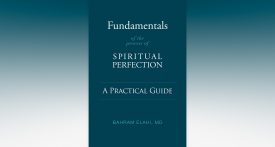 [Updated] “This path, Ostad Elahi would say, is not a path for words but one for deeds; only through action can progress be achieved.” But how are we going to take action? Where to begin? With what mindset should we set to work? The foundations of natural spirituality have been laid—a spirituality that Ostad Elahi described as “the new medicine of the soul”. They called for a practical complement, something like a student’s workbook. This need has now been fulfilled with the publication of this Practical Guide, which the author, Bahram Elahi, tells us will be followed by a forthcoming series of four additional volumes. Together, these five volumes will constitute the Fundamentals of the Process of Spiritual Perfection. The Practical Guide indisputably constitutes its core. Punctuated by inserts and diagrams, it has been designed as a handbook, and it is as such that we can make the most of it: the Practical Guide is the reference work for those who wish to study and practice the new medicine of the soul.
Read more
179
Vote
The tanbur is back… A few months ago, in 2018, a couple of steps away from the oldest piano in the world, a showcase was inaugurated in the department of musical instruments at the Met (Metropolitan Museum of Art in New York). Dedicated to a few “famous musicians” of the 20th century, it featured a Benny Goodman clarinet next to a guitar that belonged to Andrés Segovia as well as one of Ostad Elahi’s tanburs, crafted by the lute maker Nariman, along with a video including explanations and archived images that harked back to the 2014-2015 Sacred Lute exhibit, that we covered here.
Read more
194
Vote
This third article of reflection on the “Quintessence of Religions” is the last in a series dedicated to Ostad Elahi’s poem. After the question of “God” and that of “evil”, Leili Anvar’s commentary now invites us to reflect on the notion of the “good”. To give a “quintessential idea” of what the good is, Ostad Elahi reformulates here the two phases of the Golden Rule that determine what the theologian and philosopher Olivier du Roy defines as the “ethics of the reciprocity and fundamental intersubjectivity of man”.
Read more
163
Vote
After reflecting on the question of God and what “putting one’s faith in that One” truly means, we continue here our series on Ostad Elahi’s poem “The Quintessence of Religions” with a second excerpt from Leili Anvar’s commentary of this text, which was originally published (in French) in the proceedings of the symposium “Quelle sagesse pour notre temps ?”. This second excerpt examines the question of “evil”.
Read more
171
Vote
In his poem entitled “The Quintessence of Religions”, Ostad Elahi lays out in a few verses what he considers to be the result of a lifetime of experience. This “(quint)essential” summary brings to light, among other things, the relationship between ethical and divine principles. Leili Anvar made it the subject of a conference she gave in 2011 on the occasion of the “Day of human solidarity”, the video of which was posted on this very site. The text published in the proceedings of the symposium (Quelle sagesse pour notre temps ?) is a revised and more detailed version of her oral contribution.
Read more
423
Vote
“A snake-catcher went to the mountains to catch a snake by his incantations…”. Using this tale recounted by the Persian mystical poet Rumi as a starting point, Leili Anvar introduces here the notion of imperious self.
The imperious self is a central concept in Ostad Elahi’s philosophy. It is this product of the human psyche against which we must relentlessly struggle in order to make spiritual progress, for it is the origin of those of our impulses that systematically and insidiously arise to contradict correct ethical thoughts.
Read more
577
Vote
A lecture and a series of concerts presented on 16 November 2014 at the Metropolitan Museum of Art in conjunction with the exhibition The Sacred Lute: The Art of Ostad Elahi are now available in video on the website of the museum. This “Sunday at the Met” features an introduction by Ken Moore, Curator in Charge of the Department of Musical Instruments, a lecture by Jean During, Director of Research at the Centre de Recherche en Ethnomusicologie and performances by the Garcia-Fons Quartet and Parissa and Ensemble.
Read more
276
Vote
The musician, composer and writer Clive Bell dedicates his November column in the British music magazine The Wire to Ostad Elahi’s music and the current exhibition at the Metropolitan Museum of Art, “The Sacred Lute: The Art of Ostad Elahi”.
Read more
444
Vote
Ken Moore, Curator in charge of the Department of Musical Instruments at The Metropolitan Museum of Art, gives a tour of the exhibition “The Sacred Lute: The Art of Ostad Elahi” on NYC-ARTS’s latest episode.
Read more
Next »
|

 News
News Podcast
Podcast

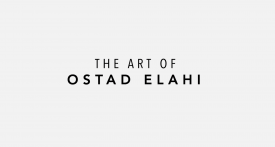





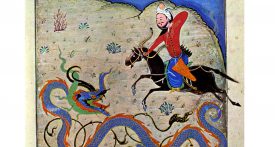
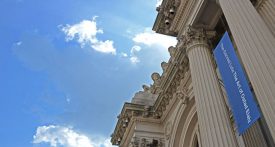

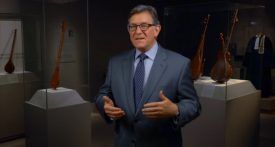


Recent Comments